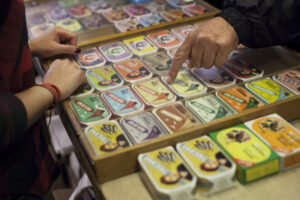Last Updated on December 19, 2025 by Emma Fajcz | Published: March 15, 2019
If there is one calling card Lisbon is famous for, and effortlessly, is food. Our guide for foodies shows you which grocery stores in Lisbon to go to and why!
Walk down any cobblestoned street in the historic center of Lisbon and count how many roasted chestnut vendors (in the winters), salted codfish stands, canned sardines’ shops, wine shops, and jam-packed grocery stores you find.
If you’re feeling the cartoon-like urge to follow the pungent cheese scent coming from the door behind that crowd of tourists, take a deep breath. There are places where customers are mostly locals and where products are better than the price tag would have you believe.
We’ll show you what grocery stores in Lisbon to peel your eyes for and what to buy.
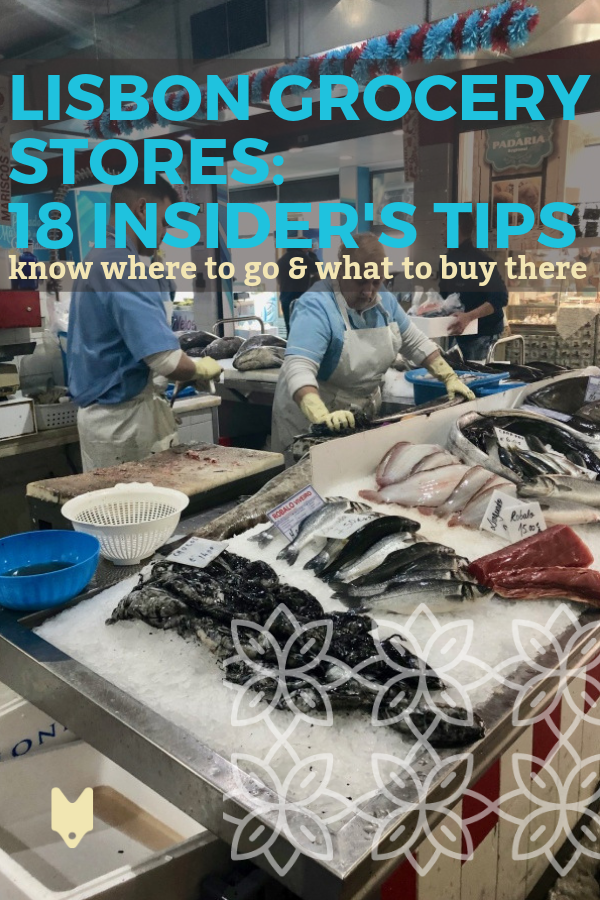
Photo credit: Sandra Henriques Gajjar, Text overlay: Devour Lisbon Food Tours
Mercearias
Mercerarias (grocery stores in English) are the ancestors of supermarkets in Lisbon before large national chains and shopping malls came along. These tiny stores, typically located in strategic locations near residential neighborhoods, are full top to bottom with anything and everything you need daily.
In the old days, people came here to mostly buy dry goods (rice, beans, flour, canned food like the now tourist-famous conservas) and regular customers had a tab (buy now, pay later or, as the Portuguese call it, fiado).
These days in Lisbon, there’s a mix of traditional mercearias that still survive, as long as there are customers to keep the business going, and other establishments, some of them more recent, that became tourists’ delight for their specialty items like cured meats (Manteigaria Silva in Baixa), fresh goat milk butter (Mercearia do Poço dos Negros in Santos), local products from the Portuguese islands of Azores (Mercearia dos Açores in Baixa), and salted cod (Pérola do Arsenal in Baixa).
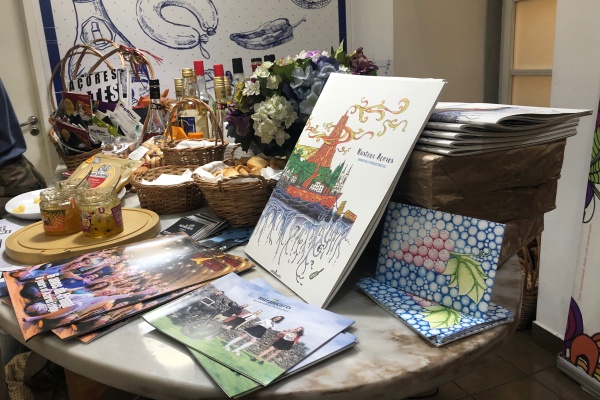
What to buy at a mercearia
- Specialty foods that you won’t find elsewhere, especially at a large chain supermarket.
- Dry goods that you need regularly, like a one-kilo bag of rock salt, rice, or pasta.
- Conservas (canned fish). They’re cheaper than at a souvenir shop and probably slightly more expensive than at a chain supermarket, but getting the local experience is priceless.
How to shop at a mercearia
- Pay with cash or ask if there’s multibanco. Some smaller shops don’t take debit card payments for purchases under €5 and some might not even accept card payments.
- Prices are fixed and there’s no bargaining. You’ll most likely come across a product that’s cheaper at a chain supermarket. Therefore it’s your decision where you buy it, but we here at Devour Lisbon believe you’ll have a more meaningful experience at a mercearia.
- Unless you’re at a specialty shop, it’s unlikely the workers speak English. Do your best to learn a few basic words in Portuguese but if that doesn’t work, mimicking goes a long way.
Insider’s tip: Some convenience stores might be mistaken with mercearias but pay attention to the signs, either the literal ones (the grocery store as a sign saying mercearia) or the subtler ones like location (in busy tourist areas rather than residential ones), type of customer (more tourists than locals), and whether or not it’s selling products for tourists only (postcards, SIM cards, cheap souvenirs).
Food Markets
While Lisboetas traditionally went to mercearias for dry goods and everyday household items, a Lisbon food market was the go-to place for fresh, seasonal fruits, vegetables, seafood, and meat.
Chain supermarkets are seemingly a more convenient one stop shop for all you need, but they don’t have the atmosphere and energy of a market, especially on a busy Saturday morning.
Sure, a market won’t have those eye-catching buy-one-take-two promotions or loyalty cards but the connection a customer establishes with a vendor is for life and in most cases transferable for the next generation.
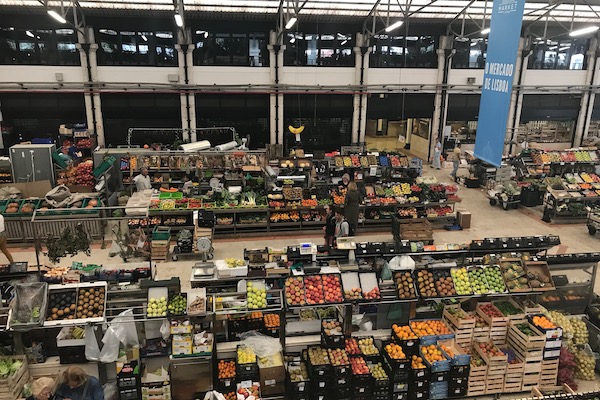
What to buy at a food market
- Seasonal and fresh fruits and vegetables. All products have to specify the country of origin, so look for the ones that say Portugal, which will probably be most of them.
- Cold cured meats from anywhere in the country and for all tastes.
- Seafood, of course! The Portuguese diet includes more seafood than meat but unfortunately, Lisbon isn’t close enough to the ocean to have its own dedicated fish market. Therefore food markets are the place to go for that plump, colorful, juicy fish that needs no more than a salad for a side dish.
- Surprisingly, Lisbon has practically one pastelaria (café and pastry shop) at every corner but not padarias (bakeries). And although pastry shops sometimes also sell bread, it’s not quite the same. If there’s a bakery at the market (not all of them have one), they’ll most likely sell regional bread that you won’t find unless you travel to buy it from the producer yourself.
How to shop at a food market
- There’s no orderly line at a market but the vendor always knows who got there first. When in doubt, they’ll ask who’s next.
- You can browse but you can’t touch the merchandise! Let the vendor do the quality checking for you and if your heart is set on that particular juicy red tomato, just point.
- Some vendors will ask you what you’re cooking but they don’t mean to be nosy. They either have a family recipe to share or want to know how you do it. Besides, sometimes knowing what you’re making is the excuse to give you a complimentary bunch of fresh parsley or coriander.
Insider’s tip: For all the tips and tricks and all you need to know about local markets, read our Lisbon Market Guide.
Wine Shops
Although you can find a decent bottle of wine at any supermarket in Lisbon, wine shops (known as garrafeiras) are the place you go to for the rarities whether that’s an expensive and old wine or the brand of a small producer who’s just starting out.
But while at a supermarket you’ll find wines for all budget ranges neatly organized by region, and Alentejo and Douro seem to always take up the bigger portions of the shelves, at a wine shop you’ll most likely get the story behind the brand. Why? Because the small wine shop owners go on scouting trips and build one-on-one relationships with all producers.
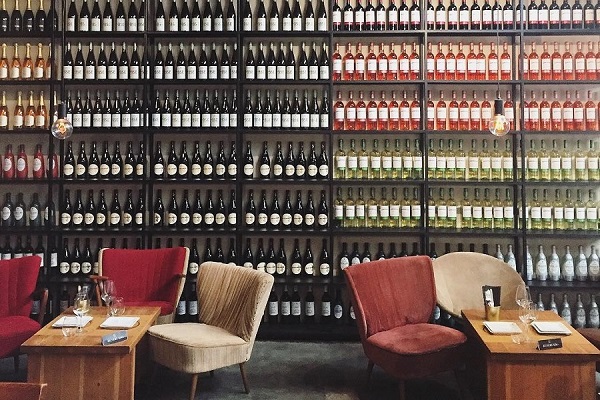
What to buy at a garrafeira
- Wine from regions you’re unfamiliar with or brands you’ve never heard about.
- Some special editions that are worth every cent, whether you’re a wine connoisseur or not.
- Budget-friendly wine that doesn’t come in a box.
How to shop at a garrafeira
- Unless you have a particular taste and know exactly what you’re looking for, let the wine shop employee help you. It typically starts with a series of troubleshooting questions, which may begin with a simple budget-related question.
- Even if you can’t tell grape varieties apart, always tell if you’re looking for a wine to drink alone or to pair with a meal. It makes all the difference!
Insider’s tip: Ideally, you don’t want to shop at big garrafeiras in the Baixa neighborhood. They cater to tourists and are typically overpriced. When it comes to wine, you want that one-on-one connection and shops off the tourist areas, like Garrafeira Estado d’Alma near Marquês de Pombal.
Want to step back in time at a traditional Portuguese grocery store that’s the only shop of its kind left in Lisbon? We’ll take you there on our Tastes & Traditions of Lisbon Tour. It’s the kind of place that makes us love what we do—and after seeing this local icon for yourself, meeting the passionate people that run it, and sampling some of their tastiest products, you’ll be utterly charmed as well.
